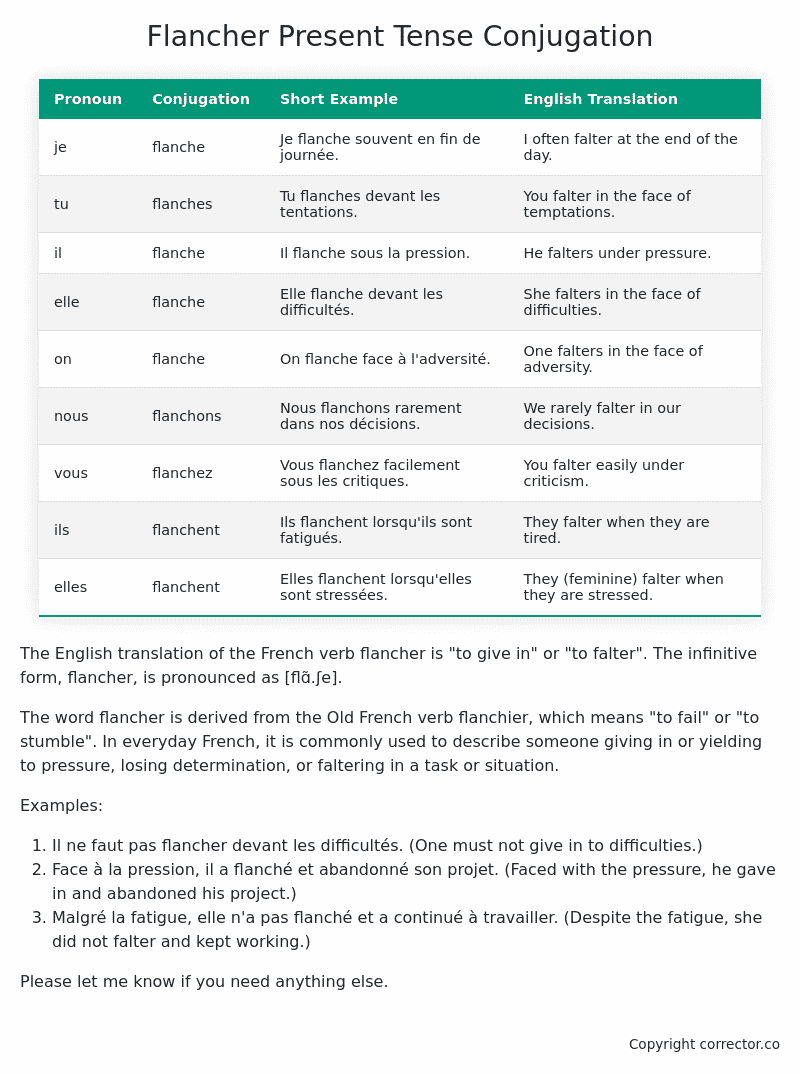Le Present (Present Tense) Conjugation of the French Verb flancher
Introduction to the verb flancher
The English translation of the French verb flancher is “to give in” or “to falter”. The infinitive form, flancher, is pronounced as [flɑ̃.ʃe].
The word flancher is derived from the Old French verb flanchier, which means “to fail” or “to stumble”. In everyday French, it is commonly used to describe someone giving in or yielding to pressure, losing determination, or faltering in a task or situation.
Examples:
- Il ne faut pas flancher devant les difficultés.
(One must not give in to difficulties.) - Face à la pression, il a flanché et abandonné son projet.
(Faced with the pressure, he gave in and abandoned his project.) - Malgré la fatigue, elle n’a pas flanché et a continué à travailler.
(Despite the fatigue, she did not falter and kept working.)
Please let me know if you need anything else.
Flancher – About the French Present Tense
To take a deep dive into all the French tenses then see our article on Mastering French Tense Conjugation.
Common Everyday Usage Patterns For Le Present
Interactions with Other Tenses
Table of the Present Tense Conjugation of flancher
| Pronoun | Conjugation | Short Example | English Translation |
|---|---|---|---|
| je | flanche | Je flanche souvent en fin de journée. | I often falter at the end of the day. |
| tu | flanches | Tu flanches devant les tentations. | You falter in the face of temptations. |
| il | flanche | Il flanche sous la pression. | He falters under pressure. |
| elle | flanche | Elle flanche devant les difficultés. | She falters in the face of difficulties. |
| on | flanche | On flanche face à l’adversité. | One falters in the face of adversity. |
| nous | flanchons | Nous flanchons rarement dans nos décisions. | We rarely falter in our decisions. |
| vous | flanchez | Vous flanchez facilement sous les critiques. | You falter easily under criticism. |
| ils | flanchent | Ils flanchent lorsqu’ils sont fatigués. | They falter when they are tired. |
| elles | flanchent | Elles flanchent lorsqu’elles sont stressées. | They (feminine) falter when they are stressed. |
Other Conjugations for Flancher.
Le Present (Present Tense) Conjugation of the French Verb flancher (You’re reading it right now!)
Imparfait (Imperfect) Tense Conjugation of the French Verb flancher
Passé Simple (Simple Past) Tense Conjugation of the French Verb flancher
Passé Composé (Present Perfect) Tense Conjugation of the French Verb flancher
Futur Simple (Simple Future) Tense Conjugation of the French Verb flancher
Futur Proche (Near Future) Tense Conjugation of the French Verb flancher
Plus-que-parfait (Pluperfect) Tense Conjugation of the French Verb flancher
Passé Antérieur (Past Anterior) Tense Conjugation of the French Verb flancher
Futur Antérieur (Future Anterior) Tense Conjugation of the French Verb flancher
Subjonctif Présent (Subjunctive Present) Tense Conjugation of the French Verb flancher
Subjonctif Passé (Subjunctive Past) Tense Conjugation of the French Verb flancher
Subjonctif Imparfait (Subjunctive Imperfect) Tense Conjugation of the French Verb flancher
Subjonctif Plus-que-parfait (Subjunctive Pluperfect) Tense Conjugation of the French Verb flancher
Conditionnel Présent (Conditional Present) Tense Conjugation of the French Verb flancher
Conditionnel Passé (Conditional Past) Tense Conjugation of the French Verb flancher
Conditionnel Passé II (Conditional Past II) Tense Conjugation of the French Verb flancher
L’impératif Présent (Imperative Present) Tense Conjugation of the French Verb flancher
L’impératif Passé (Imperative Past) Tense Conjugation of the French Verb flancher
L’infinitif Présent (Infinitive Present) Tense Conjugation of the French Verb flancher
L’infinitif Passé (Infinitive Past) Tense Conjugation of the French Verb flancher
Le Participe Présent (Present Participle) Tense Conjugation of the French Verb flancher
Le Participe Passé (Past Participle) Tense Conjugation of the French Verb flancher
Struggling with French verbs or the language in general? Why not use our free French Grammar Checker – no registration required!
Get a FREE Download Study Sheet of this Conjugation 🔥
Simply right click the image below, click “save image” and get your free reference for the flancher present tense conjugation!

I hope you enjoyed this article on the verb flancher. Still in a learning mood? Check out another TOTALLY random French verb present conjugation!


